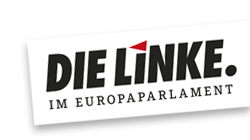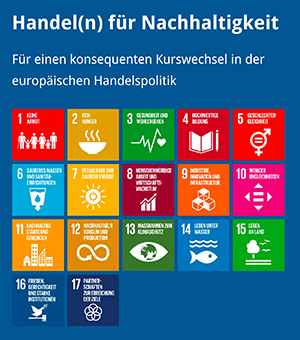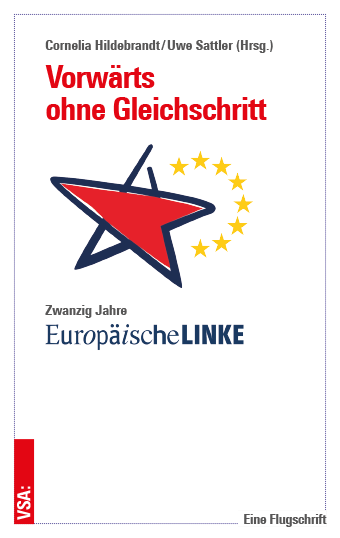Es wurde eng am Montag im Konferenzraum Maelbeek des Internationalen Pressezentrums in Brüssel: Dutzende Vertreter des Europaparlaments und von nationalen Parlamenten, von Nichtregierungsorganisationen, aus Europa und den USA hatten sich eingefunden, um eine Bestandsaufnahme der laufenden Verhandlungen über das Freihandelsabkommen EU-USA (TTIP) vorzunehmen. Und nicht zuletzt, um Strategien der parlamentarischen und außerparlamentarischen Opposition gegen das Abkommen und die daraus resultierenden Gefahren zu entwickeln. Eingeladen zu dem Treffen hatten Helmut Scholz und der Vizefraktionsvorsitzende der LINKEN im Bundestag, Klaus Ernst, sowie das Brüsseler Büro der Rosa-Luxemburg-Stiftung.
Der Zeitpunkt war gut gewählt. Am selben Tag begann die inzwischen 6. Verhandlungsrunde zu dem Freihandelsabkommen – abermals hinter verschlossenen Türen. So betonte Helmut Scholz, dass die Linksfraktion im Europaparlament schon vor Beginn der Verhandlungen drei zentrale Ziele hinsichtlich TTIP gestellt hatte: Die Gespräche müssten zu 100 Prozent transparent geführt werden, die Verhandlungsziele öffentlich gemacht und „rote Linien“ eingezogen werden, mit denen erreichte Standards insbesondere bei Arbeits-, Umwelt- und Verbraucherrechten, bei Datenschutz, Kultur, öffentlicher Daseinsvorsorge und Lebensmittelsicherheit geschützt werden. Allerdings seien diese auch von zahlreichen Nichtregierungsorganisation, Gewerkschaften und selbst von kritischen Politikern anderer Parteien unterstützte Forderungen ignoriert worden. Daher und vor dem Hintergrund der bekannt gewordenen Fakten aus den Gesprächen (Redemanuskript von Helmut Scholz unten) müsse TTIP abgelehnt werden.
Besonders kritisch sahen die Teilnehmerinnen und Teilnehmer des Workshops die vorgesehenen Regelungen bei Klagen von Konzernen gegen neue Gesetze der EU oder ihrer Mitgliedstaaten. In dem sogenannten ISDS-Verfahren können Konzerne gegen neue Gesetze oder Regulierungen vorgehen, wenn sie durch diese ihre Gewinnerwartungen gefährdet sehen. Über die Klage entscheidet dann kein nationales oder europäisches Gericht, sondern ein Tribunal aus drei Fachanwälten für Investitionsrecht. Gegen deren Urteil ist keine Revision möglich. Staaten wie Kanada, Australien, Ecuador oder Südafrika haben mit solchen Verträgen bereits sehr schlechte Erfahrungen gemacht und wurden zum Teil zu Entschädigungszahlungen in Milliardenhöhe verurteilt. Daraufhin beschlossen die Regierungen der letzteren drei, nie wieder Verträge abzuschließen, die ISDS beinhalten.
Klaus Ernst warnte in dem Workshop jedoch davor, TTIP „mit Scheuklappen“ zu sehen. So liefere das analoge, bereits ausgehandelte Abkommen mit Kanada (CETA) die Blaupause für den EU-USA-Vertrag. Dabei hätten sich bereits die Befürchtungen, die Kritiker auch gegen TTIP hegen, bewahrheitet. Daher wende sich die Linke gegen beide Vereinbarungen. Wie dies geschehen könnte, riss der Politiker aus Berlin stichpunkthaft an: Die Debatte müsse in die Parlamente der Staaten ebenso wie in das Europäische Parlament getragen werden, die breite Öffentlichkeit über die Folgen informiert, Netzwerke in Europa und darüber hinaus geknüpft werden, die die Zivilgesellschaft umfassend einbeziehen. Dieser Ansatz stieß bei den versammelten Parlamentariern, ob nun aus Spanien, Deutschland oder der Niederlande, auf Zustimmung und wurde ebenso von den NGO-Vertretern unterstützt. Sharon Treat vom Maine House of Representatives (USA) betonte diesen Ansatz ausdrücklich. Nehme doch auch in den Vereinigten Staaten die Sensibilität gegenüber TTIP zu. Übrigens auch bei kleinen und mittleren Unternehmen, die eine „Marktbereinigung“ durch Großkonzerne fürchten, wusste Treat zu berichten. Die Politikerin aus den USA berichtete zudem über die Zuständigkeit der US-Bundesstaaten beispielsweise für eine schärfere Umweltgesetzgebung. So bestünden erhebliche Unterschiede zwischen den bestehenden Regulierungen in Kalifornien und Main zu Texas oder Iowa. Die Parlamente der Bundesstaaten befürchten durch TTIP Senkungen ihrer Standards und Kompetenzen. Dies sein ein wichtiger Ansatzpunkt für die Zusammenarbeit mit TTIP-Kritikern jenseits des Atlantiks.
Als Ergebnis des Brüsseler Treffens gründeten die Teilnehmerinnen und Teilnehmer das Netzwerk „Parlamentarier gegen TTIP“, das Brüssel koordiniert werden soll. Für den Hebst dieses Jahres ist ein noch breiter angelegtes Treffen geplant.
In Sachen internationale Vernetzung schloss sich am Montag und Dienstag in Brüssel ein weiteres Treffen an: Vertreter von zahlreichen zivilgesellschaftlich Organisationen fanden sich zum 2. Multisektoralen Strategietreffen der Zivilgesellschaft zu TTIP zusammen.
TTIP Workshop Parliamentarians against TTIP network
Presentation MEP Helmut Scholz
State of Play of the TTIP Negotiations
Dear colleagues,
Welcome to our second meeting to build up a network of left wing parliamentarians against TTIP from the European, Member State and regional levels.
My task as coordinator of the GUE/NGL group in the Committee on International Trade in the European Parliament is to share with you news stemming from the privileged access to information I have in that function. I receive printed copies of certain negotiation documents which are classified as confidential. Unfortunately, the Commission does not allow us to copy these documents for you or the wider public and threatens to cut this information channel if I do.
In contrast to what is stated publicly, the negotiations are progressing. Soon the negotiators will work on the basis of consolidated texts, merging the offers and texts presented by either side. These documents will contain agreed paragraphs as well as passages that are still in brackets as proposals differ. These documents will not even be given out as printed copies to us. We will be allowed to see them in a reading room, not being allowed to take copies or to consult our experts.
For the sixth negotiation round starting today, the Commission has announced negotiations on almost all sectors of the agreement. The three main areas of negotiations are market access, for goods as well as for services, then regulatory cooperation, both sectoral and horizontal, and finally the so called trade rules for the 21st century.
On market access for goods the parties had exchanged offer already earlier this year. The EU offers to abandon 97% of all tariff lines, with the rest being reduced gradually over the coming years and only a few products carved out as sensitive. This accommodates one of the most important offensive interests of the US, the export of agricultural products. The NGO Corporate Europe Observatory has revealed documents that show that Argo-industry companies have been the sector most aggressively lobbying for the TTIP negotiations, including demands for regulatory changes. GMO products and the infamous chlorinated chicken have been at the centre of public concerns regarding TTIP. But even if the Commission was telling the truth and EU regulations would not be altered, the competitiveness of US agro-industrial products would still be a threat to our farmes, in particular to small and environmentally friendly producers. Every country that has signed an FTA with the United States has suffered high losses in its agricultural sector afterwards.
In my view, the farmers in our countries should be our natural allies in our struggle against TTIP. They are put at high risk. Their role in preserving nature and culture is being ignored. As communities and as consumers we are directly effected by the fate of our farmers.
The U.S. In return have offered only 80 percent abolition of tariff lines. The Commission considers this offer unacceptably low and has signalled to the U.S. That they refuse further talks and market access for goods unless the U.S. improve their offer. The Commission is convinced that the U.S. would actually also want to go much further, but made a tactical mistake.
On services, the EU Commission recently delivered a market access offer. The document has over 100 pages. The offer lists a number of Member State and EU reservations. In the list system applied it is necessary to actively raise reservations, otherwise a service is in the scope of liberalisation. For public utilities, many reservations have been expressed. Fresh water supply can be maintained in public hands. But waste water and waste management are included in the offer. Cultural services including performing, theatres, and libraries are also part of the EU offer, with the exception of audiovisual services. Education is also included, but with a number of existing Member State reservations listed. Private health services are also included, with several reservations listed. The EU Commission has for the time being not made an offer for market access for financial services. This is a reaction to the refusal of the U.S. to negotiate regulatory aspects of financial services. In principal, the Commission wants financial services and their regulation to be part of TTIP.
Access to the public procurement market, in particular on sub-national levels, is one of the major offensive interests of the EU Commission. On national level, there is already agreement between the parties that the recently modified Government Procurement Agreement (GPA) in the WTO framework shall be the reference document. The Commission argues however, that sixty percent of public procurement in the U.S. take place on sub-central levels and demands from the U.S. to endeavour on making a proposal how to include their states and cities and agencies into TTIP commitments. The U.S. face constitutional difficulties to accommodate this demand. The EU proposes thresholds for goods above 200,000 Special Drawing Rights (SDR) and for construction of 5 Million SDR. All States, all counties above 700,000 population, all cities above 250,000 population shall open their public procurement for EU companies, all domestic content provision shall be abolished. Public universities and hospitals above 500 beds shall also be covered by TTIP.
The Commission sees a link in the negotiations on goods (including agriculture), services and procurement and wants to seek balancing offers.
On regulatory cooperation, there are negotiations on a horizontal approach, including the creation of a Regulatory Council within TTIP as proposed by Commissioner DeGucht. In parallel there are sectoral negotiations for the automotive, chemical, pharmaceutical, medical devices, cosmetics, engineering and machineries, textiles, and ICT sectors. Early Commission documents listed these sectors as examples for possible mutual recognition of test procedures and market license. Recently the Commission denied this, claiming that EU regulations such as REACH would remain unchallenged by TTIP.
Documents produced so far indicate however, that the Commission seems to be happy to give up the European precautionary principle in favour of the U.S. risk based approach. In various texts the key words "scientific evidence" have been included, exactly the phrase the U.S. use regarding EU concerns on for instance market access restrictions for GMOs. Mutual recognition is now replaced by recognised equivalence. While either party can maintain import requirements, it shall be up to the exporting party to ensure compliance. In the proposed text on sanitary and phytosanitary measures, GMOs are not explicitly mentioned.
Another approach common in different sectoral negotiations is the establishment of annexes that list mutually accepted substances, for instance in chemicals. Finally there is often reference to standards defined by international organisations like the OECD, for instance in the case of pesticides and accepted residual levels. Documents include a call to align respective legislation.
Institutionally, there seems to be agreement to establish a set of specialised committees in TTIP, for instance an SPS Joint Management Committee, reporting to the yet unnamed TTIP Oversight Body.
All this work interferes with tasks currently dealt with in parliamentary committees on EU and Member State level. The democratic control over many regulatory issues would be diminishing. A study on this question commission by the European Parliaments Environment Committee came to the result, that the acquis communitaire is threatened by TTIP regarding environmental, health and consumer protection levels.
This threat is even increased by the planned inclusion of an investor-to-state dispute settlement (ISDS) mechanism into TTIP. While officially negotiations on this aspect have been put on hold by the Commission, the plan is still there and has already manifested in the agreement EU-Canada (CETA). According to the Commission, by early July more than a record 70,000 contributions to the ISDS public consultation have been received. A factual report, including numbers of submission and geographic share, shall be published soon after the consultation was closed (July 13, 2014). The final report, including the content analysis, will not be ready before November 2014.
Finally, on the so called trade rules for the 21st. century. This includes the issues competition, a chapter on support for SMEs, a chapter on access and cooperation regarding energy and raw materials, investment rules, and on IPR. Both parties also want to agree on coordinated initiatives in international organisations, using their combined strength to define standards and to expand them to other trade partners. In fact, the Commission confirmed that the U.S. have proposed to include an accession clause for other countries into TTIP.









